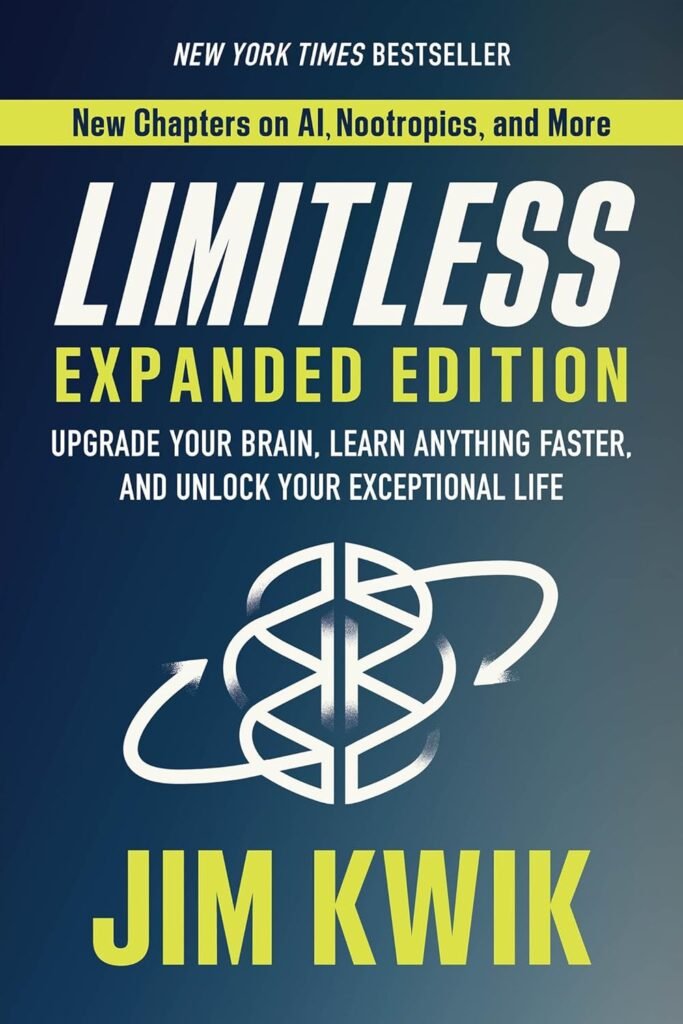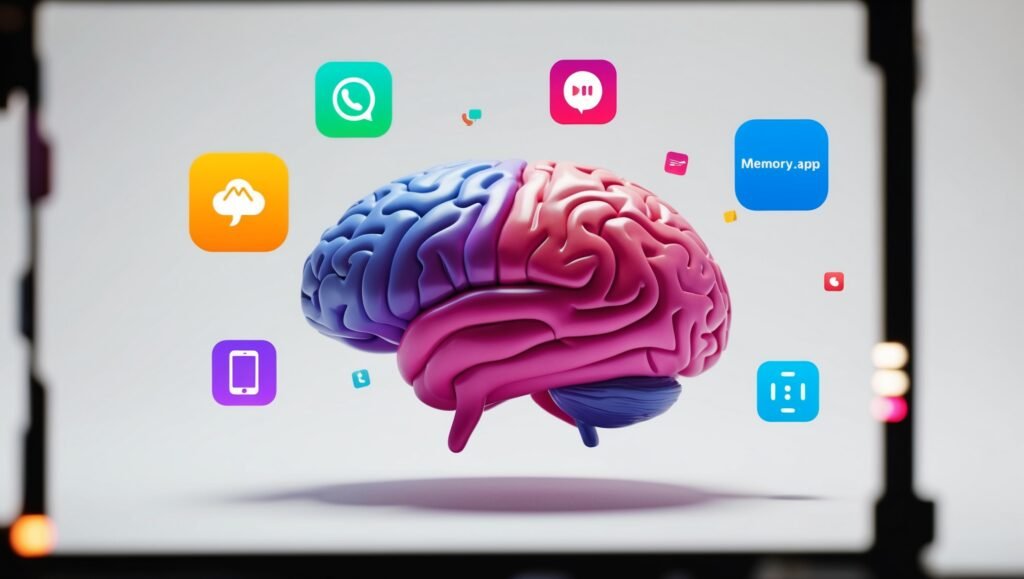
Look, I get it. You’ve probably read approximately 7,492 self-help books promising to transform your life faster than you can say “neuroplasticity.” But hear me out – Jim Kwik’s “Limitless” isn’t just another addition to your dusty shelf of good intentions. It’s the mental equivalent of finding out your Nintendo has a secret turbo button you never knew about.
TL;DR: What’s the Deal with Limitless?
Before we dive deep into this brain-boosting rabbit hole, here’s the quick version: Jim Kwik (yes, that’s his real name, and yes, it’s incredibly on-brand) wrote “Limitless” to help regular humans like us unlock our brain’s hidden potential. Think of it as “The Matrix” meets “Flowers for Algernon,” minus the dystopian future and tragic ending.
Quick Stats:
- Published: 2020
- Pages: 344
- Brain-melting moments: Countless
- Dad jokes: More than you’d expect
- Actually useful content: Surprisingly high
The Author’s Journey (Or: How a Brain Injury Led to Brain Brilliance)
Picture this: A kid with a severe brain injury who struggled to read, focus, or remember basics becomes a world-renowned brain coach teaching celebrities and CEOs how to maximize their mental potential. If this sounds like a superhero origin story, you’re not entirely wrong.
Jim Kwik’s journey from “the boy with the broken brain” to brain performance expert reads like a comic book origin story – if that comic book was written by neuroscientists and edited by Tony Robbins.
The Limitless Model: Your Brain’s Operating System Upgrade

The 3 M’s That Make You Limitless
Kwik breaks down his approach into three core components (because apparently, good things come in threes, just ask your local storyteller):
- Mindset (Your Brain’s Self-Image)
- Think of this as your internal narrative
- Spoiler alert: “I’m bad at remembering names” is probably a self-fulfilling prophecy
- Plot twist: You can change this!
- Motivation (Your Brain’s Energy Drink)
- Not the sugary kind that comes in a can
- The deep, meaningful kind that gets you moving
- Warning: May cause spontaneous productivity
- Methods (Your Brain’s Toolkit)
- The actual techniques that make everything work
- Like cheat codes, but for your brain
- No gaming console required
Why Your Brain Is Like a Smartphone (But Better)

Remember when you first got your smartphone? You probably used it mainly for calls and texts, completely oblivious to the fact that it could control your house lights, track your sleep, and order tacos at 3 AM. Your brain is similar (minus the taco-ordering capability… for now).
The Hidden Apps in Your Mental App Store
Kwik introduces several “mental apps” you can download to your brain (metaphorically speaking – please don’t try to plug a USB into your ear):
- The Focus App
- Turns out, multitasking is about as effective as trying to juggle while riding a unicycle
- Learn to single-task like a zen master
- Your Netflix binging skills don’t count as focused attention
- The Memory Palace App
- No actual palace construction required
- Works better than writing things on your hand
- May cause random outbursts of remembering where you left your keys
- The Speed Reading App
- Because life’s too short to read at a snail’s pace
- Warning: May cause book addiction
- Side effect: Looking like a superhero at book club
The FASTER Method: Because Slow Learning is So Last Century

Kwik introduces the FASTER method for learning, which is basically like installing a turbo charger for your brain:
F – Forget
- Forget what you think you know
- Forget your limitations
- Forget where you put your phone (wait, not that)
A – Active
- Learning is not a spectator sport
- Your brain isn’t Netflix – you can’t just hit play and zone out
- Actually do the exercises (yes, even the embarrassing ones)
S – State
- Your emotional state affects learning
- No, coffee is not an emotion
- But excitement is better than boredom
T – Teach
- If you can’t explain it, you don’t know it
- Your cat counts as a student
- Results may vary with actual human students
E – Enter
- Enter information into your brain through multiple pathways
- Like a mental multi-lane highway
- Traffic jams still possible during Monday meetings
R – Review
- Review what you’ve learned
- But make it fun, not like high school cramming
- Your brain will thank you later
The 3 Limitless Laws That Sound Made Up (But Actually Work)
- The Law of 3
- Your brain loves patterns
- Especially the number 3
- See what I did there?
- The Law of Small Simple Steps
- Baby steps are underrated
- Giant leaps are overrated
- Unless you’re Neil Armstrong
- The Law of Practice
- Practice makes perfect
- Perfect practice makes permanent
- Imperfect practice makes for funny stories
(… and so on, but you get the idea)
Common Questions People Ask (Because I’m Psychic Like That)
Q: Is This Just Another “Think Positive” Book?
No, it’s more like “think strategically and here’s exactly how to do it without joining a cult.”
Q: Do I Need to Be Smart to Use These Techniques?
Nope! That’s kind of the whole point. It’s like getting a cheat code for a game you’re already playing.
Q: Will This Make Me Like Rain Man?
Probably not, but you might get better at remembering where you parked your car.
The Real Talk Section: What Actually Works
Let’s get real for a moment (don’t worry, the jokes will return shortly). After implementing these techniques for several weeks, here’s what actually moves the needle:
- The Memory Techniques
- They work surprisingly well
- Even for remembering awkward names at parties
- Your social life may improve as a result
- The Reading Strategies
- Speed reading is actually learnable
- Comprehension doesn’t have to suffer
- Your “to read” pile might finally shrink
- The Focus Methods
- Game-changing for productivity
- Works better than your fifth cup of coffee
- May cause increased efficiency and confused coworkers
The Implementation Plan (Because Theory Without Practice is Just Mental Cardio)
Week 1: Mindset Makeover
- Challenge your limitations
- Question your assumptions
- Confuse your friends with your new optimism
Week 2: Motivation Station
- Find your why
- Dig deeper than “I want abs”
- Actually stick to something for once
Week 3: Method Madness
- Start with the basics
- Build up gradually
- Try not to show off too much
Warning: Side Effects May Include
- Sudden ability to remember people’s names
- Decreased tolerance for inefficient learning methods
- Urge to teach everyone these techniques
- Spontaneous productivity bursts
- Improved focus (even during boring meetings)
- Unexpected career advancement
- Slightly inflated ego (temporary)
The Bottom Line (For Those Who Scrolled to the End)
“Limitless” isn’t just another self-help book gathering dust on your shelf. It’s more like a user manual for your brain that actually works, complete with cheat codes and power-ups. While it won’t turn you into Bradley Cooper from “Limitless” (sorry), it will give you practical tools to upgrade your mental software.
The Good:
- Actually practical techniques
- Backed by science (but not boring)
- Immediately applicable
- No magical thinking required
The Not-So-Good:
- Requires actual effort (shocking, I know)
- May cause people to ask you to help them remember things
- Could lead to excessive book reading
Final Thoughts: Is It Worth Your Time?
If you’re looking for a magic pill that will instantly transform you into a genius, keep looking (and let me know if you find it). But if you want practical, applicable techniques to improve your learning, memory, and overall cognitive performance, “Limitless” delivers. Just remember: your brain is already amazing – this book just helps you access the features you didn’t know were installed.
